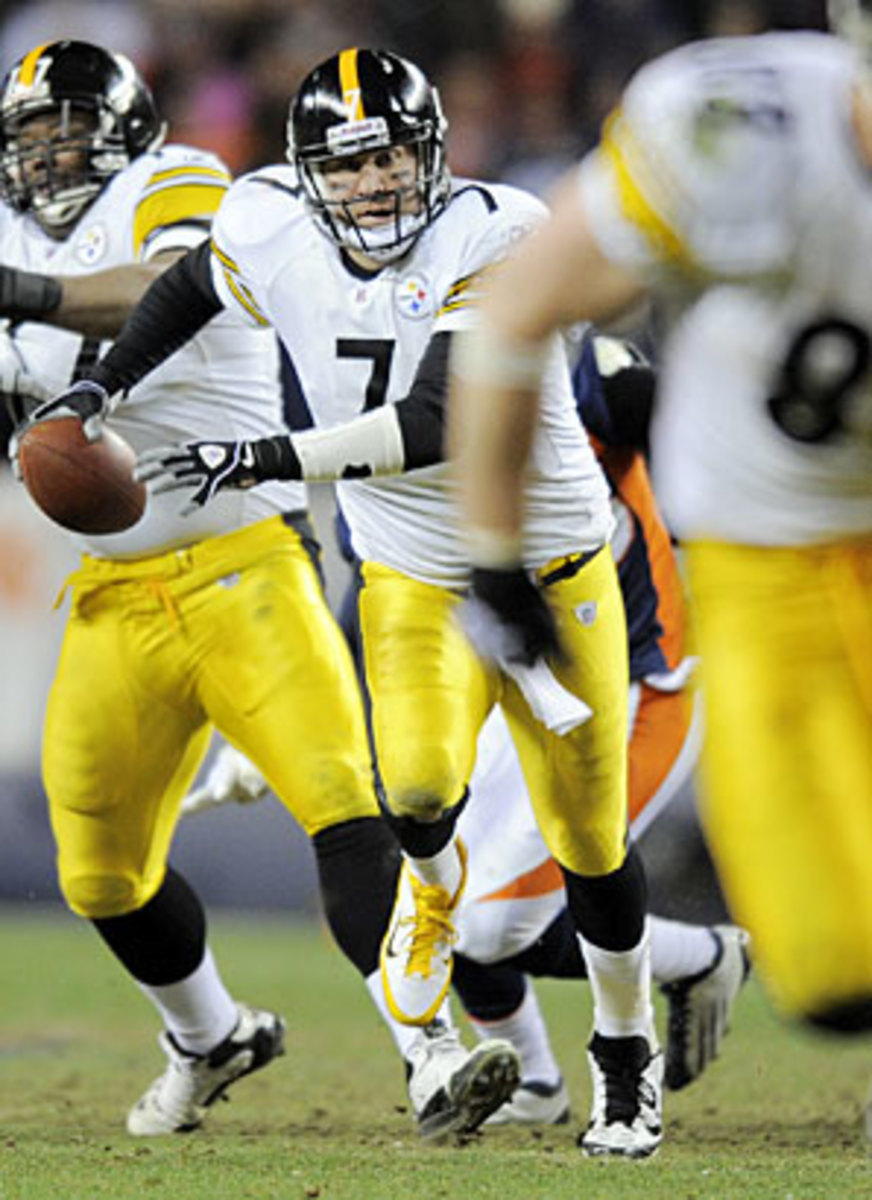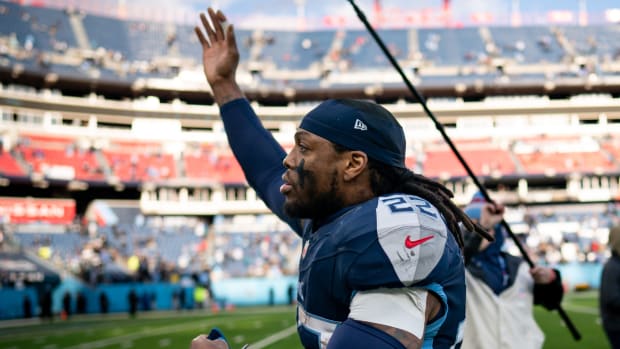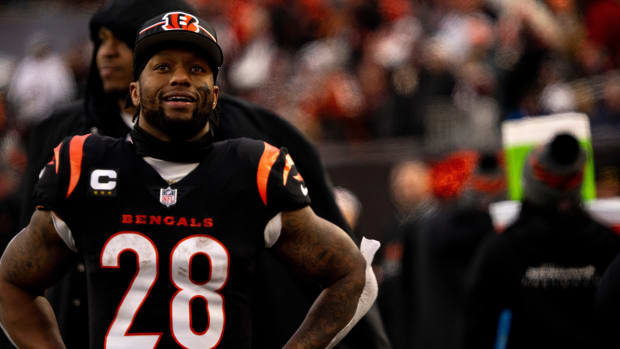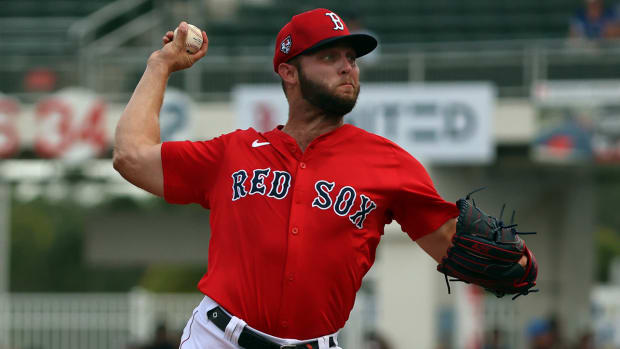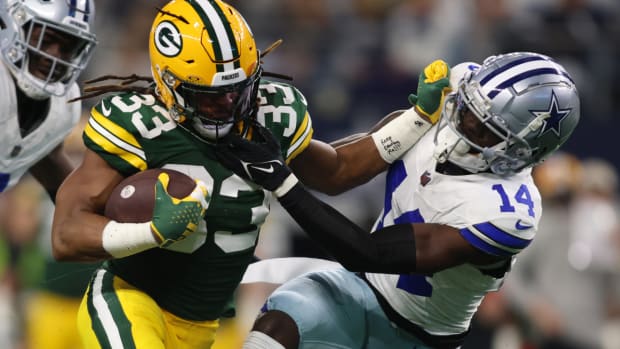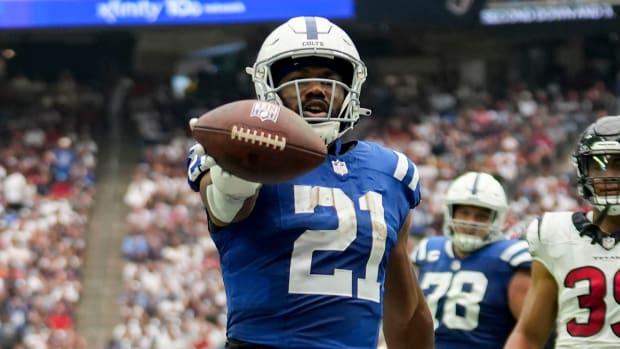NFL fantasy 2012 QB health report
No matter which rankings you use to prep for your draft (or auction -- trust me, it's better), you're going to need to factor in injury risk. The NFL is a hard game, even with the best efforts of the NFL and NFLPA to keep things a bit safer. The most devastating for any team is if, in the words of Al Davis, the QB goes down and he goes down hard. We had some warning on Peyton Manning last season, but injuries to Matt Schaub, Matt Cassell
Deconstructing rankings with a medhead perspective isn't disrespectful or even questioning. It's like being Robin to Batman. Batman had better toys, but Robin was there when that one henchman snuck around. Batman never had eyes in the back of his head.
QBs are probably the most dependent position when it comes to injury risk. It's obvious that offensive lines are perhaps the biggest factor, but WRs and TEs are as well. If a WR can't break off a route and get open for a quick target after a jailbreak blitz gets through, your QB is going to take another hit. If the RB behind him can't pick up a blitz, things get a bit more risky. Even the scheme the QB runs factors in greatly. Add those to the typical factors like injury history, athleticism and more, and you'll end up with a risk adjustment that helps determine value.
This year, I'll be going team-by-team through the QBs (and in coming days, the other fantasy relevant positions), helping you assess the risk relative to the reward. It's the most complete look at risk you'll find anywhere, on the web or the newsstand. Some risks are apparent, but even the least risky QB is only one hit away from a serious injury that will cost him the rest of the season. The strategy then is to balance the risk, putting a less risky QB with the riskier ones, which is going to require a higher draft pick.
Ryan Fitzgerald is a "game manager" type of QB, hardly big praise, but he's also smart enough -- he went to Harvard, you know -- to keep himself from taking the big hits. When he does, he's big enough to handle most of them. In a RB-RB-WR-WR draft, a very popular pattern, getting a consistent, healthy QB is a key. Fitzgerald can be that.
Ryan Tannehill is likely to take the job eventually, but David Garrard seems to have the early advantage. Garrard was relatively healthy through his career, but at the end of his time in Jacksonville, things got iffy. The upside here is that he gets back to his 2010 pace with the TDs, scrambles into some rushing TDs, and has enough weapons to manage a game. He's not the worst late-round QB pick and should be near the top of waiver lists in the first half of the season. Of course, you have to watch Hard Knocks to get more insight.
I don't see the difference between Tom Brady's situation a couple years ago after he tore his ACL and the injury that sidelined Peyton Manning. Brady's all the way back, either the second or third QB coming off the board in all leagues and formats. I know some didn't think Manning would get his arm strength back and an ACL rehab is pretty much a known, but I still want to make the point that Brady did come back, all the way back. He's got at least a couple more years in him.
Yes, Mark Sanchez is the QB. I don't know what to call Tim Tebow ... in any sense. Sanchez's reduction in plays will hurt his value, but might keep him a bit healthier. Maybe Tebow's real value is in keeping Sanchez a bit healthier, though health is the one skill that Sanchez has demonstrated consistently. The O-Line has been a big part of that and should keep him that way again if you decide to let Sanchez fall to you.
Joe Flacco takes heat, both in Baltimore and in fantasy circles, for not doing more. He's got a great RB and a deep threat, but Flacco's probably not going to change much from what he's done the last few seasons. He's consistent, relatively healthy, but unexciting.
Andy Dalton exploded onto the scene, surprising nearly everyone as his pairing with A.J. Green recalled the Young-Rice, Aikman-Irvin and Manning-Harrison duos. He did show some signs of wear in the second half, missing some time with a sore shoulder and sore hip. If that's the worst of it, he's fine, but it's worth noting that he's taking those kinds of hits.
Sure, Brandon Weeden's older, but Weeden's healthy, which is more than we can say about Colt McCoy so far. Given his baseball background and the high volume of passing that the Browns did last season (in the absence of a healthy RB), maybe we should talk about a pitch count.
Ignore the rotator cuff talk. Ben Roethlisberger played with an injured one last year and did pretty well. What we look for is function and symptomology, not semantics. Roethlisberger is a pretty good value at his current ADP, but at what point does his body rebel? He's played through some nasty injuries and done so at a high level, but as the Steelers transition to a more pass-focused attack, Roethlisberger will both take more pocket hits and have to scramble a bit more. The latter is where he takes the bigger hits. The Steelers have upgraded their line this off-season, so there's hope, but I think we'll see Roethlisberger miss at least a couple games this season.
Matt Schaub should be able to come back from the foot issue that cost him and the Texans greatly last season. But it will likely be something else. That the Texans shopped around a bit for a QB tells me that they don't believe he can stay healthy, and the success of T.J. Yates tells me that Schaub is something of a system QB anyway. Is that enough to drop him much? Probably not, but if you draft Schaub, you'd better upgrade the slot you have for your QB2. I'd even go so far as to say that you need to immediately back-up Schaub with another teen-ranked QB in drafts.
It's impossible to escape the Andrew Luck-Manning comparisons. But is health a valid comparison? Probably not. While the offense is changing under Bruce Arians, the O-Line is more closely related to the one from last season, the one that got Kerry Collins and Curtis Painter knocked around. Luck's better, but Luck has to be healthy. I'll bet Arians sacrifices some offense to keep Luck better protected.
Blaine Gabbert didn't miss time because of injury, but ineffectiveness. Granted, the weapons around him and the O-Line were subpar, but Gabbert doesn't have any single skill that says things will change this season, especially if Maurice Jones-Drew's holdout extends.
Jake Locker will battle with Matt Hasselbeck for the starting spot, but we all know who Hasselbeck is by now. Locker is more of a black box. He's a tools guy who hasn't shown whether he can handle an NFL game. I'll lean to giving him a chance, since Tennessee's line is great in pass blocking, rated No. 2 by Football Outsiders' stats.
There's no bigger unknown in this year's draft than Peyton Manning. He missed a full season, and now the NFL's biggest creature of habit will have to start doing things in a new place with new people around him. The neck itself isn't a problem -- the fusion took and he can take hits if necessary. Where I am worried is that he might lose just a tick of that quick release, leaving him to take more hits. It might not be his neck, but his shoulder or knee or lower back, the kinds of things an older QB doesn't like to have sore on Monday morning. I think we overvalue the injury risk and undervalue the rest of the risks because of who Manning is and what he's done. There's going to be one guy in every draft that thinks Manning will be fine and will overdraft him. Don't be that guy. You'll likely miss out on him at this level, but list discipline will really help you.
Bones heal. Matt Cassel's hand is recovered from the fracture that ended last season. He struggled without a running game, but he should have a better one with a healthy Jamaal Charles and the addition of Peyton Hillis. Jim Zorn comes in with the new staff, so maybe there's still some upside in Cassel. I wouldn't worry too much about the fluke fracture when assessing his risk.
Don't forget that Carson Palmer was this close to having his elbow reconstructed just a few seasons back. He's shown that he can still play, and stay healthy, but with that injury, his age, and the Raiders offense, Palmer's about as risky as they come. The upside is in the deep ball and long TDs that the Raiders could put up with their speed. Color me curious to see how Terrelle Pryor develops. If the Jets use of Tim Tebow has early success, it wouldn't surprise me to see the Raiders try something with Pryor.
Philip Rivers is many things, but lead among them is durable. He's not terribly mobile, but he has ideal size and has five years running of starting all 16 games.
Tony Romo is getting a bad rap. He's not as injury-prone as most think, having played 16 games four of the last six years. He missed time with a broken collarbone after getting slammed to the turf, but that's something that could happen to any QB. He takes a lot of hits, so there's some risk, just not as much as most think in the fantasy world. There's still some upside here.
A lot of Eli Manning's success has to be traced back to his DNA. The Mannings know how to stay healthy, have a solid work ethic and are smart enough to adjust. Amazingly, Eli might be healthier than Peyton. He already has more rings, but is he actually the better QB?
Without getting too moral here, the narrative on Michael Vick for the last two seasons has been that he can change. People seem to think that Vick won't run as much or that he'll at least learn to slide. There's just no evidence of that -- at all. Vick is much slighter than most realize. While Cam Newton and Robert Griffin have 20 and 10 pounds on him, respectively, at the listed weights, few think Vick is really 215. He's maybe 200, especially as the season goes on. I worry that any age-related loss of quickness is going to cost him one or two more hits a game, hits he's shown he can't take.
Robert Griffin III is going to get overdrafted a lot. Part is based on his success and talent. Part is based on people who missed drafting Cam Newton last season. He has the same upside, perhaps better weapons, and an offense that's designed for him. He's not quite as big as Newton and his speed advantage won't be the same that he had in the Big 12. It's hardly an insult to say that Griffin's probably somewhere between Newton and Vick, upside and downside.
The new offense the Bears will run and the weapons he has should help Jay Cutler. The thumb injury that ended his season has healed and has limited recurrence risk, so don't factor that into his draft position. Where I do worry is the pattern of injuries we see from Cutler -- they come late, which indicates that he's being worn down. The sacks could be a big part of that and if those are reduced, Cutler's got a bit more upside.
So you think this is the year that Matthew Stafford stays healthy. He's certainly got the talent to be an elite level QB, but placing a guy with this injury history over someone like Eli Manning or Matt Ryan is a stretch. The argument for Stafford is that physical maturity, experience, or a change in the offensive line or scheme is going to make him a healthier player. There's no evidence that the first two have anything to do with health. Stafford's injuries are those of most QBs -- traumatic, essentially random. It's "one bad hit," not any sort of genetic proclivity. Stafford's risk is simply too high at his ranking.
Aaron Rodgers is about as low risk as a QB can be. So when you think back to him missing time with a concussion, at how much he runs and exposes himself to hits, you have to also wonder how any QB makes it through a season healthy. The Packers upgraded their O-Line, so having Rodgers as low-risk doesn't worry me at all. Just don't confuse low-risk with risk-free.
Christian Ponder's running ability is overlooked, especially considering how bad his O-Line was last season. He ran to survive, not thrive. He's likely to get a bit more opportunity this season, especially as the team is easing Adrian Peterson back in. The schedule helps, with Jacksonville and Indy in the first two weeks. He got knocked around a bit, seemingly being ground down by his first season and all the hits, but that's pretty common for rookies. His health risk might be his biggest positive.
Matt Ryan came into the league touted as a Peyton Manning starter kit and he's matched that. He hasn't had the same upside, but he's hardly a bust. Part of that skill set is health, largely because of a quick release and a good instinct for the rush. No reason to think that will change in '12.
The rule is that running QBs take more hits, and more hits equals more injuries. Cam Newton, and to some extent, Tim Tebow, challenge that. These guys are bigger than most running backs, a far cry from previous running QBs, who tend to be Vick's size. A good past comparison is Randall Cunningham, who at 6-4, 212 pounds is more comparable. At 6-5, 244, with speed and quickness, Newton smartly didn't take a lot of hits last season, but when he did, he was as likely to be giving as good as he got. Newton has the mass to go with the force, a combo we haven't seen before, and that might change the injury equation slightly. I'd actually rank him slightly higher because of the rushing TDs and my belief that his running isn't a significant injury risk.
The only real uncertainty here is the drama of the coaching situation. There's no reason to think Drew Brees won't be the same QB he has been the last few years. The offense is focused around keeping him healthy, and a healthy Brees is a monstrously productive Brees.
Josh Freeman wasn't unhealthy last year, just bad. He's come back to a new staff with a new commitment. He's down 30 pounds in hopes of being more mobile, though mass sometimes helps QBs when running. (It doesn't help taking hits, in case you were wondering, though it does make the tackler hurt a bit more. Physics can be fun.) If you liked Freeman last year but got burned, the same talent is still there, plus some new weapons.
Kevin Kolb may lose the job before the season, and if not, he'll likely lose it in season anyway. There is yardage to be compiled here, with Michael Floyd joining Larry Fitzgerald, so anyone with the requisite skills could put up some decent fantasy numbers. Kolb hasn't stayed healthy as a starter, so there's no reason to think it will be him for very long. John Skelton has the size, but no one's sure about the skill. In other words, injury risk is the least of the problem here.
We still don't know how good Sam Bradford can be. He's spent as much time on his back as in the pocket, with far too much time in the training room. It's not his fault, given the hits he's taken. Maybe Jeff Fisher and his new staff can figure things out, but absent a wholesale improvement in blocking, Bradford now occupies the space once held by Stafford. He's the ultimate "what if" QB.
Jim Harbaugh might be a miracle worker, but Alex Smith always had some talent. He's a better runner than most knew, at least before that big playoff bootleg let the secret out. He's been relatively healthy over his career and could have the best WR corps he's had, going four deep if Randy Moss' return is real.
Matt Flynn hasn't won the job outright, but he has the most upside and is most likely to start the season. That's not to say that Flynn is or isn't good, or is or isn't risky. No QB is going to get hurt holding a clipboard, but he's not going to put many points on the board, either.
































